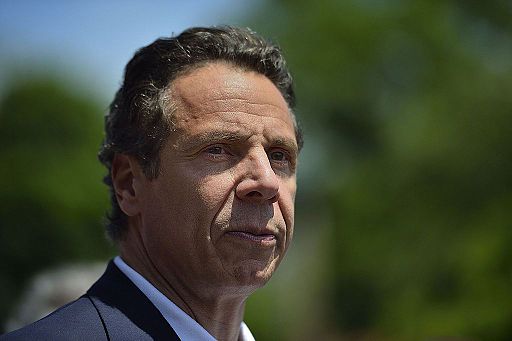Half of Voters View Cuomo Favorably;
New Yorkers Give Him Weak Job Performance Ratings;
Especially on Corruption, Education, Infrastructure, Economy
Support for Mass Transit/Road Spending; Divided on How to Pay for It
Minimum Wage Increase, SAFE Act Continue to Be Strongly Supported; Only One in Five Says Common Core has Improved Public Education
Loudonville, NY. Governor Andrew Cuomo’s favorability rating, 50-42 percent, is unchanged from last month, and his overall job performance rating is also largely unchanged, according to a new Siena College poll of New York State registered voters released today. On six of seven specific issue job performance ratings, at least
60 percent of voters say Cuomo is doing only a fair or poor job.
More than two-thirds of voters think that New York should fund both downstate mass transit and upstate roads, for similar amounts, although there is less agreement on how to fund infrastructure spending, with a plurality saying cuts to existing state programs should be the source for most of the money. Large majorities of voters continue to support increasing the minimum wage to $15 per hour and the nearly three-year-old SAFE Act. By a two-to-one margin, voters think Common Core has worsened, not improved, public education and a small plurality think those educational standards will continue to worsen public education in the future.
“Cuomo appears to have landed on a new plateau as about half of voters view him favorably over the last several months and more than 40 percent view him unfavorably. And his overall job performance rating has also remained fairly constant for much of the year, with 41 percent now rating the job he’s doing as Governor excellent or good and 58 percent rating it as only fair or poor,” said Siena College pollster Steven Greenberg.
“On key issues, however, the Governor has not succeeded in convincing voters that he’s going a good job,” Greenberg said. “On six – reducing corruption, improving public education, balancing upstate and downstate needs, improving infrastructure, improving the economy, and planning for New York’s future – only between 23 and 35 percent of voters say Cuomo has done an excellent or good job. Even a majority of Democrats give him a negative job performance rating on each.”
Given four choices for Cuomo’s greatest asset as Governor, 21 percent said it was his ability to get opposing groups to work together, 20 percent said his vision for New York’s future, 20 percent said he gets things done, and 18 percent said he makes tough decisions, while 10 percent volunteered that he has no real assets. As to his greatest weakness as Governor, 30 percent said he doesn’t achieve consensus on important issues, 22 percent said he jumps from issue to issue without a plan, 19 percent said he doesn’t work well with others, and 10 percent said he puts off making tough decisions.
“Voters are nearly evenly divided among four traits in trying to determine Cuomo’s greatest asset as Governor with little partisan or geographic differences,” Greenberg said. “Is it a positive that voters rank four Cuomo traits as virtually equal in defining his greatest asset or is it a negative that no single trait stands out for voters? It may help to explain his consistent middle-of-the-road standing with voters of late.”
Strong Consensus for Infrastructure Spending; Little Consensus on How to Pay for It
Seventy-one percent of voters say New York should fund downstate mass transit and upstate roads for similar amounts, 11 percent say fund mass transit but not roads, six percent say fund roads but not mass transit, and three percent say neither should be funded.
“In light of the recent commitment by the Governor to spend more than $8 billion for the MTA’s capital plan, there is strong consensus among New Yorkers that there should be comparable funding for both downstate mass transit and upstate roads. More than two-thirds of Republicans, nearly three-quarters of Democrats and independents, two-thirds of downstaters and more than three-quarters of upstaters agree,” Greenberg said.
“There is not, however, that same level of consensus on how to fund large infrastructure projects. A plurality, 38 percent say most infrastructure spending should be funded by cuts to existing state programs, while 24 percent say increased state taxes and 23 percent increased state borrowing,” Greenberg said. “A majority of Republicans and pluralities of independents, upstaters and downstate suburbanites want cuts to fund infrastructure, while a plurality of Democrats say taxes and New York City voters are evenly divided among the three.”
Strong Support for Minimum Wage Increase Continues
“By a 62-35 percent margin, voters support Cuomo’s proposed minimum wage increase to $15 per hour, up a little from 59-38 percent last month,” Greenberg said. “Democrats overwhelmingly support the increase, while independents are evenly divided and Republicans oppose the increase 58-39 percent. While upstate voters are divided, there is strong support for the increase in the downstate suburbs and overwhelming support in the City.
“By a nearly identical 62-33 percent margin, voters agree with the arguments of minimum wage supporters, rather than the arguments of opponents,” Greenberg said.
SAFE Act Support Remains Consistently Strong
“Nearly three years after its enactment, support for the SAFE Act remains consistently strong, with 59 percent of voters supporting it and 33 percent opposing. It was supported 62-33 percent in May, 58-33 percent last December and 63-32 percent in March 2014,” Greenberg said. “The SAFE Act continues to be strongly supported by Democrats, independents and downstate voters. It is opposed by a small majority of Republicans and upstate voters continue to be closely divided on the SAFE Act.”
Voters Say Common Core Has Worsened Public Education; Not Optimistic It Will Improve Going Forward
“By a 40-21 percent margin, voters say Common Core standards have worsened, not improved, public education, with another 21 percent saying they have had little impact,” Greenberg said. “Looking forward, a small plurality of voters, 34 percent, say Common Core standards will worsen public education in the long run, compared to 30 percent who say they will improve education and 20 percent who say they will have little impact.”
Plurality of Voters Now Say State is Headed on the Right Track
“For the first time since April, more voters, 46 percent, say the state is on the right track, compared to 39 percent who say the state is headed in the wrong direction. Last month, wrong direction led 49-41 percent, a net 15-point improvement in how New Yorkers view the direction of the state,” Greenberg said. “New York City voters are most optimistic, with 52 percent saying the state is on the right track. However, upstate voters moved the most on this question since last month and are now closely divided on this question, while downstate suburbanites are evenly divided. Both non-New York City regions were very negative about the state’s direction last month.”
One Year from Election Day, Views on Schumer Favorability, Re-election Little Changed
“Senator Chuck Schumer has a nearly two-to-one favorability rating, 58-30 percent, little changed from last month’s 61-29 percent,” Greenberg said. “Little changed too is voters’ opinion on his re-election. With no current opponent, 49 percent say they are prepared to re-elect Schumer, while 38 percent say they would prefer ‘someone else.’ Strong majorities of Democrats and New York City say re-elect the Senate Democratic leader-in-waiting.”
ConCon Vote Remains Mystery for Vast Majority; Support for ConCon Weakens, Still Strong
“More than 70 percent say they have heard nothing at all about the 2017 vote on whether New York should hold a Constitutional Convention, comparable to July’s Siena College Poll finding,” Greenberg said. “However, while support for a ConCon remains very strong, 60-25 percent, it is down from July when support was 69-15 percent.”
# # #
This Siena College Poll was conducted October 18-22, 2015 by telephone calls conducted in English to 806 New York State registered voters. Respondent sampling was initiated by asking for the youngest male in the household. It has an overall margin of error of +/- 4.0 percentage points including the design effects resulting from weighting. Sampling was conducted via a stratified dual frame probability sample provided by Survey Sampling International of landline and cell phone telephone numbers from within New York State weighted to reflect known population patterns. Data was statistically adjusted by age, party, region and gender to ensure representativeness. The Siena College Research Institute, directed by Donald Levy, Ph.D., conducts political, economic, social and cultural research primarily in NYS. SRI, an independent, non-partisan research institute, subscribes to the American Association of Public Opinion Research Code of Professional Ethics and Practices. For more information, call Steve Greenberg at (518) 469-9858. For survey cross-tabs: www.Siena.edu/SRI/SNY.





